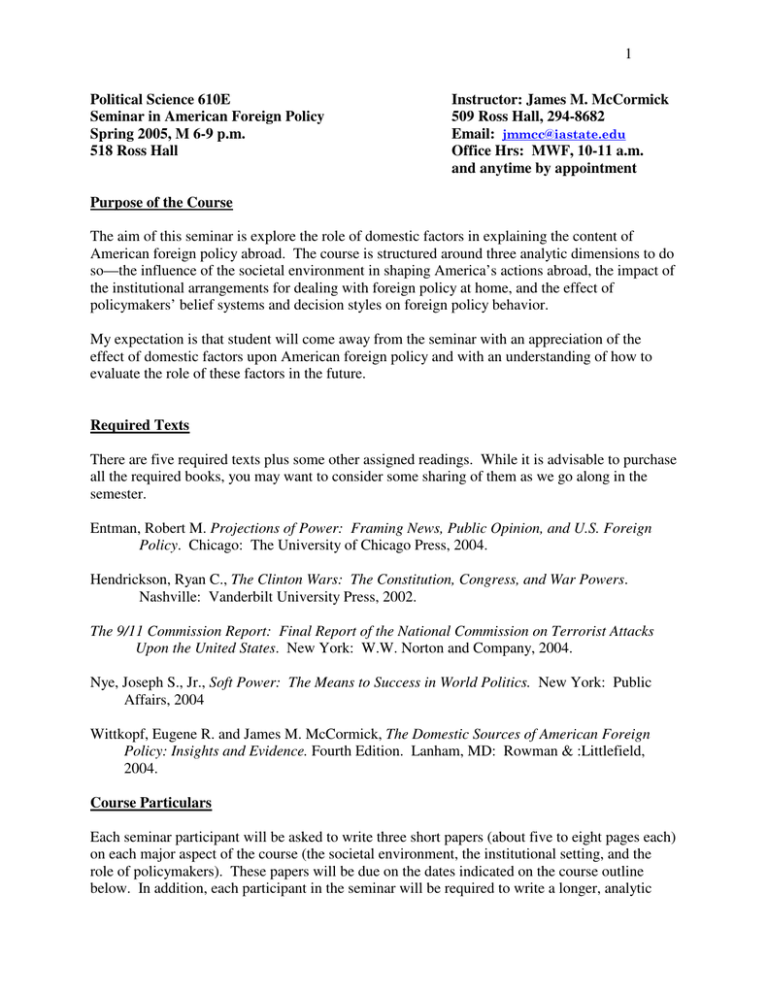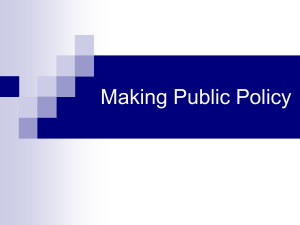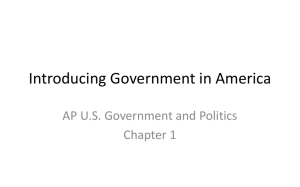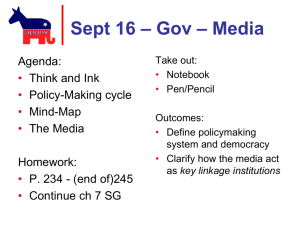1 Political Science 610E Instructor: James M. McCormick
advertisement

1 Political Science 610E Seminar in American Foreign Policy Spring 2005, M 6-9 p.m. 518 Ross Hall Instructor: James M. McCormick 509 Ross Hall, 294-8682 Email: Office Hrs: MWF, 10-11 a.m. and anytime by appointment Purpose of the Course The aim of this seminar is explore the role of domestic factors in explaining the content of American foreign policy abroad. The course is structured around three analytic dimensions to do so—the influence of the societal environment in shaping America’s actions abroad, the impact of the institutional arrangements for dealing with foreign policy at home, and the effect of policymakers’ belief systems and decision styles on foreign policy behavior. My expectation is that student will come away from the seminar with an appreciation of the effect of domestic factors upon American foreign policy and with an understanding of how to evaluate the role of these factors in the future. Required Texts There are five required texts plus some other assigned readings. While it is advisable to purchase all the required books, you may want to consider some sharing of them as we go along in the semester. Entman, Robert M. Projections of Power: Framing News, Public Opinion, and U.S. Foreign Policy. Chicago: The University of Chicago Press, 2004. Hendrickson, Ryan C., The Clinton Wars: The Constitution, Congress, and War Powers. Nashville: Vanderbilt University Press, 2002. The 9/11 Commission Report: Final Report of the National Commission on Terrorist Attacks Upon the United States. New York: W.W. Norton and Company, 2004. Nye, Joseph S., Jr., Soft Power: The Means to Success in World Politics. New York: Public Affairs, 2004 Wittkopf, Eugene R. and James M. McCormick, The Domestic Sources of American Foreign Policy: Insights and Evidence. Fourth Edition. Lanham, MD: Rowman & :Littlefield, 2004. Course Particulars Each seminar participant will be asked to write three short papers (about five to eight pages each) on each major aspect of the course (the societal environment, the institutional setting, and the role of policymakers). These papers will be due on the dates indicated on the course outline below. In addition, each participant in the seminar will be required to write a longer, analytic 2 paper on the impact of a specific domestic factor on shaping American foreign policy. These papers should be completed in time so that they will be presented to the seminar during the last two or three meetings in the semester. Each seminar participant should set up a meeting with me to discuss her/his topic for this paper. Ideally, these meetings should take place within the first two or three weeks of the seminar. I would also ask each participant to submit a short written proposal on this paper by the middle of the semester. The paper itself will be due by April 25. Class attendance and participation are required. From time to time, I will ask individuals to present a summary of some of the assigned reading to the class as part of our discussion. As a portion of your final course grade, the short papers, the analytic paper, and the seminar participation will be weighted as follows: Short Papers Analytic Paper (and Proposal) Participation 40% 40% 20% The ± grading system will be used on the final course grade. At any time, if you have questions on the readings or course procedures, please feel free to ask. Please address any special needs or special accommodations with me at the beginning of the semester or as soon as you become aware of your needs. Those seeking accommodations based on disabilities should obtain a Student Academic Accommodation Request (SAAR) form from the Diability Resources (DR) office (515-294-6624). DR is located on the main floor of the Student Services Building, Room 1076. TENTATIVE COURSE OUTLINE I. Introduction Meeting of January 10: Introduction; Focus of the Seminar; How to Analyze Foreign Policy; Jack Snyder, “One World, Rival Theories,” Foreign Policy (November/December 2004), pp. 53-62. Nye, Soft Power: The Means to Success in World Politics, pp. ix-xiii, 1-32 II. The Societal Environment and American Foreign Policy Meeting of January 17: No Class Nye, Soft Power, pp. 33-72 3 Meeting of January 24: Historical Traditions in American Foreign Policy Walter Russell Mead, “The American Foreign Policy Tradition,” in Walter Russell Mead, Special Providence, pp. 3-29 (on reserve) Robert Tucker and David C. Hendrickson, “Thomas Jefferson and Foreign Policy,” Foreign Affairs 69 (Spring 1990): 135-156 (on reserve) Hans Morgenthau, “The Mainsprings of American Foreign Policy,” in James M. McCormick, A Reader in American Foreign Policy, pp. 33-51 (on reserve) Nye, Soft Power, pp. 73-98 Meeting of January 31: The Domestic/International Setting of American Foreign Policy Today Samuel Huntington, “The Erosion of American National Interests,” in Domestic Sources, pp. 55-65. Joseph Nye, “Beyond September 11,” in Domestic Sources, pp. 25-31 Stanley Hoffmann, “Why Don’t They Like Us?” in Domestic Sources, pp. 33-41 The 9/11 Commission Report, pp. 1-70. Nye, Soft Power, pp. 99-147 Meeting of February 7: Political Parties and Interest Groups Miroslav Nincic, “Elections and U.S. Foreign Policy,” in Domestic Sources, pp. 117-127 Peter D. Feaver and Richard H. Kohn, “The Gap: Soldiers, Civilians, and their Mutual Misunderstanding,” in Domestic Sources, pp. 85-95 Philip Brenner, Patrick J. Haney, and Walter Vandenbush, “Intermestic Interests and U.S. Policy toward Cuba, “ in Domestic Sources, pp. 67-83 4 February 7: Meeting of February 14 Assignment #1 Due Write an essay in which you identify two or three historical or contemporary societal factors that continue to impact the direction of American foreign policy. Use evidence to demonstrate and support your arguments. You may, of course, use the course readings in writing the essay, but the best essays are likely to incorporate additional research as well. Public Opinion, the Media, and Foreign Policy Shoon Kathleen Murray and Christopher Spinosa, “The Post 9/11 Shift in Public Opinion: How Long Will It Last,” in Domestic Sources, pp. 97-115 See “American Public Opinion and Foreign Policy,” the US Report for 2004 at the following web site http://www.ccfr.org/globalviews2004/sub/usa.htm Robert M. Entman, Projections of Power, entire book III. The Institutional Setting and American Foreign Policymaking Meeting of February 21: : The Executive and Foreign Policymaking Louis Henkin, “Foreign Affairs and the Constitution,” Foreign Affairs 66 (Winter 1987/88): 284-310 Michael Nelson, “Person and Office: Presidents, the Presidency, and Foreign Policy,” in Domestic Sources, pp. 145-153 Hendrickson, The Clinton Wars, pp. 1-67 5 Meeting of February 28: Congress and Foreign Policymaking Hendrickson, The Clinton War,pp. 68-173 Louis Fisher, “Presidential Wars,” in Domestic Sources, pp. 155-169 James M. Lindsay, “From Deference to Activism and Back Again: Congress and the Politics of American Foreign Policy,” in Domestic Sources, pp. 183-195 Meeting of March 7: Bureaucracies and Foreign Policymaking Ivo H. Daalder and I. M. Destler, “How National Security Advisers See Their Role,” in Domestic Sources, pp. 171181 Strobe Talbott, “Globalization and Diplomacy: The View from Foggy Bottom,” in Domestic Sources, pp. 197-206 James M. Goldgeier, “NATO Expansion: Anatomy of a Decision,” in Domestic Sources, pp. 319-334 The 9/11 Commission Report, pp. 254-323 March 7: Assignment #2 Due Write an essay in which you discuss the role of an institution (e.g., Congress or presidency but also political parties, media, and the public) in the foreign policy process. How much impact does the institution have on foreign policy? Under what conditions does it affect America’s response abroad? How consistent is the available evidence to support your position? 6 Meeting of March 21: Bureaucracies and the Events of 9/11 John Deutch and Jeffrey H. Smith, “Smarter Intelligence,” in Domestic Sources, pp. 219-226 The 9/11 Commission Report, pp. 254-323 Ivo H. Daalder and I. M. Destler, “Advisors, Czars, and Councils: Organizing for Homeland Security,” in Domestic Sources, pp. 227-235. IV. Decisionmakers and American Foreign Policymaking Meeting of March 28: Rational Choice Models and Foreign Policymaking Graham Allison and Philip Zelikow, “Model I: The Rational Actor,” Essence of Decision, pp. 13-54 (on reserve) Stephen Krasner, “ Are Bureaucracies Important? A Reexamination of Accounts of the Cuban Missile Crisis,” in Eugene R. Wittkopf, The Domestic Sources of American Foreign Policy, 2nd ed., pp. 311-323 (on reserve) Meeting of April 4: Bureaucratic Politics Models and Foreign Policymaking James C. Thompson, Jr., “How Could Vietnam Happen: An Autopsy,” in Domestic Sources, pp. 259-270 Christopher M. Jones, “Roles, Politics, and the Survival of the V-22 Osprey,” in Domestic Sources, pp. 283-301 Steve Smith, “Policy Preferences and Bureaucratic Position: The Case of the American Hostage Rescue Mission,” in Domestic Sources, pp. 303-318 7 Meeting of April 11: Psychological Models and Foreign Policymaking Jon Western, “Sources of Humanitarian Intervention: Beliefs, Information, and Advocacy in U.S. Decisions on Somalia and Bosnia,” in Domestic Sources, pp. 335-351 Margaret Hermann and Thomas Preston, “Presidential Leadership Style and the Foreign Policy Advisory Process,” in Domestic Sources, pp. 363-380 Fred Greenstein, “The Changing Leadership of George W. Bush: A Pre- and Post-9/11 Campaign,” in Domestic Sources, pp. 353-351 April 11: Assignment #3 Due Write an essay in which you evaluate the rational, bureaucratic politics, or psychological models of foreign policy making. What are the attractive features of the model that you have selected? What are its major weaknesses in explaining foreign policymaking? What evidence can you bring to bear from the readings or elsewhere to support your choice of this model over the others? Meeting of April 18: Paper Presentations Meeting of April 25: Paper Presentations Final Exam Meeting as Scheduled







